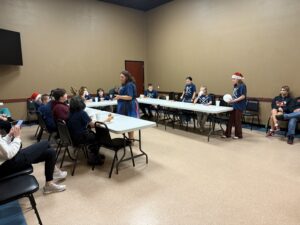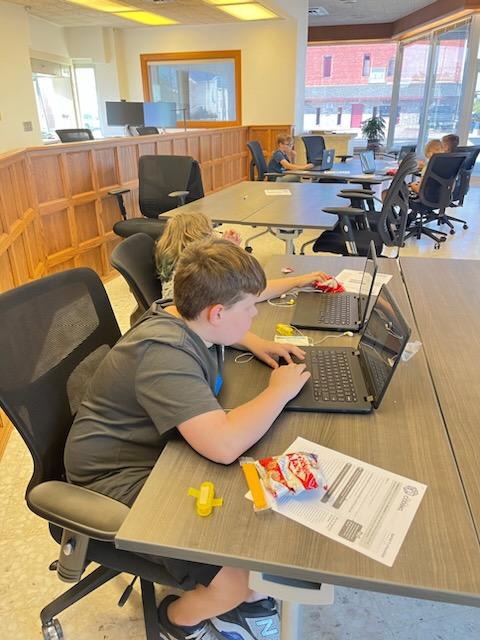
Coding, Collaboration, and Competition: Inside the Youth Coding League
October 6, 2023 by Jessika Leatherbury
By: Sunnie Dawn Baker
 It was August 29th and the anticipation in the Ada Jobs Foundation Conduit offices was palpable. Twelve fifth and sixth graders from three different schools in Pontotoc County opened their Chromebooks nervously, excited to begin their journey into the Youth Coding League (YCL). It was something they had never heard of before. While there are over 85 teams nationwide, in ten different states, this had never been done before in Oklahoma. The idea of a competitive coding team for middle schoolers was a new concept in the area. But nevertheless, even though this was unfamiliar territory, the Conduit Coders were ready to jump in headfirst, learn about coding and computer science, and make their community proud.
It was August 29th and the anticipation in the Ada Jobs Foundation Conduit offices was palpable. Twelve fifth and sixth graders from three different schools in Pontotoc County opened their Chromebooks nervously, excited to begin their journey into the Youth Coding League (YCL). It was something they had never heard of before. While there are over 85 teams nationwide, in ten different states, this had never been done before in Oklahoma. The idea of a competitive coding team for middle schoolers was a new concept in the area. But nevertheless, even though this was unfamiliar territory, the Conduit Coders were ready to jump in headfirst, learn about coding and computer science, and make their community proud.
The Youth Coding League began as an idea in 2018. Chris Carnell, the co-founder of Codefi in Cape Girardeau, MO, had a vision for a program where students could learn how to code but still feel as valued by their community in a way similar to football players or cheerleaders. He wanted to create competitive coding teams, complete with team hats and jerseys.
He had founded Codefi as an Economic Development Organization committed to tech startups, co-working spaces, and digital skilling. While Codefi had adult education programs that taught coding skills, they wanted attract a more diverse population into the coding world. This required reaching diverse coders at a much younger age. In many cases, once they were adults, it was too late. He started digging into what could be done to remedy this issue and came across the idea of the “middle school cliff,” where the percentage of girls in STEM disciplines decreases dramatically. He brought in Stacy Lane to help him build out a vision for a youth coding program in March of 2018 and five months later, the Youth Coding League was launched.
The Codefi Foundation on Rural Innovation had given them funding to put the program in ten schools in Cape Girardeau and Jackson, Missouri. However, when Lane reached out to the schools, they were largely skeptical and uninterested. While she could get four or five schools to commit, the majority told her to come back after the program had been running for a couple of years.
To say Lane was discouraged would be an understatement. However, she kept pushing forward and hosted coding camps all summer. Through these camps, Lane came to the attention of Cristy Crites, an art teacher, at Scott County Central in Sikeston, MO. Though Crites taught art, she was also building a robotics program at her school. She contacted Lane and asked her to come see the STEAM lab she had built at her school. Though Crites was interested in joining the Youth Coding League, her school was not in the designated area of service laid out by the foundation, though she was forward thinking enough to realize the impact that this program could have on her students. Lane and Carnell went to the foundation and asked them to open the program regionally so that some of these other schools could participate and their request was granted.
Crites says, “Because of YCL, I was able to not only feed the robotics program with experienced coders, but it fueled a hunger in students for knowledge, challenges, and programming skills along with the thrill of competition. All of which were key to a successful robotics program. Nothing like either of these programs were ever offered at my school.” What was supposed to be a program for fifth and sixth graders in ten local schools within a ten-mile radius became a regional effort in Missouri. And now, five years later, they have added a seventh and eighth grade program and it has gone from 150 coders on ten teams to 902 coders on a total of 82 teams.
The YCL first came to the attention of Sunnie Dawn Baker, the Ada Jobs Foundation’s Digital Content Manager, when she heard Lane speak at the Rural Innovation Network Summit in Michigan this past May. Baker went to learn more about rural innovation and helping entrepreneurs create tech startups, but when she left, she had found a new passion in the good that could come in her community from the Youth Coding League. After learning more, Baker expressed interest in coaching a team and sat down with Jim Eldridge, CEO of the Ada Jobs Foundation; he agreed that the Ada Jobs Foundation should sponsor a fifth and sixth grade county-wide team. Thus the Conduit Coders were born.
Each week the students meet at the Conduit Initiative’s offices for two hours while they work on a “Sprint.” Sprints are computer programming projects where the students must complete specific objectives while also using their own creativity. These sprints teach the young coders to use logic and troubleshoot while also infusing their projects with their own vision and uniqueness. Each week, the individual sprints are scored on eight different criteria ranging from code documentation to reliability to creativity. The more creative and complex a program is, the higher the score it will receive. After their first sprint, the Conduit Coders were 13th out of 47 other fifth and sixth grade teams in the nation; after their second sprint, they jumped to 7th, with one student tied for first in the nation and another tied for 13th. Almost half of the coders are in the top 100 out of 567 participants, and it is still early in the season. After their first eight sprints in the regular season, they enter the postseason where they get to work together to work on larger, more individualized, projects that will go head-to-head against the other teams in the country until there are two top projects in the league: one for technical merit and one for community favorite.
The Youth Coding League is providing these students with a fun way to learn more about computer science and programming in a competitive and collaborative environment. These are skills that will be useful as they grow older because technology is only going to become more of a necessity, not less. In addition to this, though, these projects teach them logic, troubleshooting, and perseverance. It teaches them that they can do hard things and they can do them well, which might be the most important skill of all.
Sign up to receive more news from the Ada Jobs Foundation HERE!
Written by
Jessika Leatherbury
You may also interested in:

Adapt and Overcome: Allison Poe’s Recipe for Resilience and Growth
By: Sunnie Dawn Baker Allison Poe has always followed her feet. She waits for the signs to appear and, once she recognizes them, she travels that path, and has never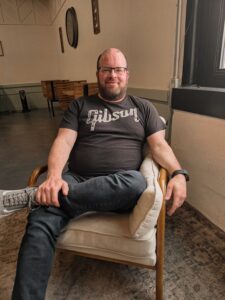
Jeff Warren: A Life in Sound, Vision, and Storytelling
By: Sunnie Dawn Baker When Jeff Warren got involved in the Houston music scene as a teenager, he had no clue where his path would lead. Now, nearly thirty years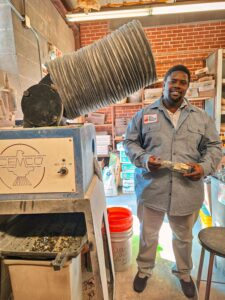
From Pitch to Progress: ECU's Glass Recycling Program Turns Waste into Opportunity
By: Sunnie Dawn Baker In 2018, Dr. Christine Pappas competed in Ada Jobs Foundation’s Big Pitch Competition by promoting grinding glass bottles into sand. She won the Big Pitch that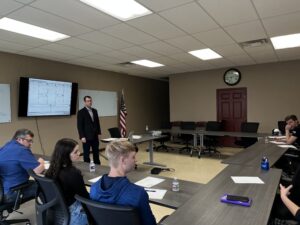
The Importance of Customer Discovery: Know Your Audience and Know Your Market
By: Sunnie Dawn Baker Entrepreneurs and small business owners must consider many factors to achieve success, with their target market being one of the most crucial. Sometimes, when people are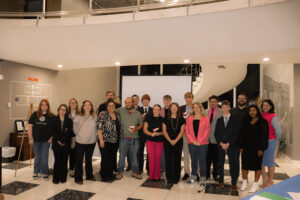
What Does Economic Development Do for You? The Significance of the Economic Multiplier
By: Sunnie Dawn Baker People often find the term “economic development” vague and confusing. Understanding how economic development works and benefits the community can be challenging. Though there are many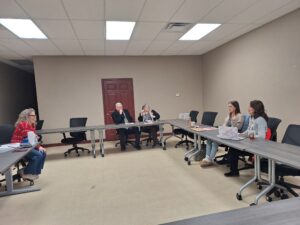
Helping Entrepreneurs One Workshop at a Time: Lauri Rowe and QuickBooks for Small Businesses
Entrepreneurs tend to be filled with passion and big ideas. They have found a solution to a problem they see in the world, and they barrel ahead, excited for their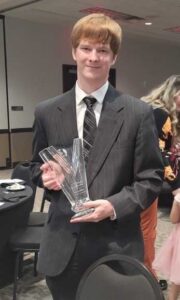
Hunter Cook: Technology, Entrepreneurship, and the Written Word
By: Sunnie Dawn Baker Hunter Cook started writing when he was seven years old. At first, he wanted to write comic books, but then he realized he couldn’t draw. He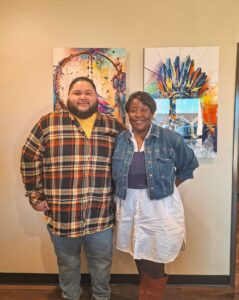
Empowering Native Artists: FAME App Brings Innovation to First American E-Commerce
By: Sunnie Dawn Baker Entrepreneurs are problem solvers. They are constantly striving for solutions to issues they see in the world or in their own lives. In the case of
Learn, Connect, and Grow: 2025 Workshops for Aspiring and Current Business Owners
By: Sunnie Dawn Baker A new year brings new possibilities, and, at the Ada Jobs Foundation, it also brings a new round of programming and workshops. As the local Economic